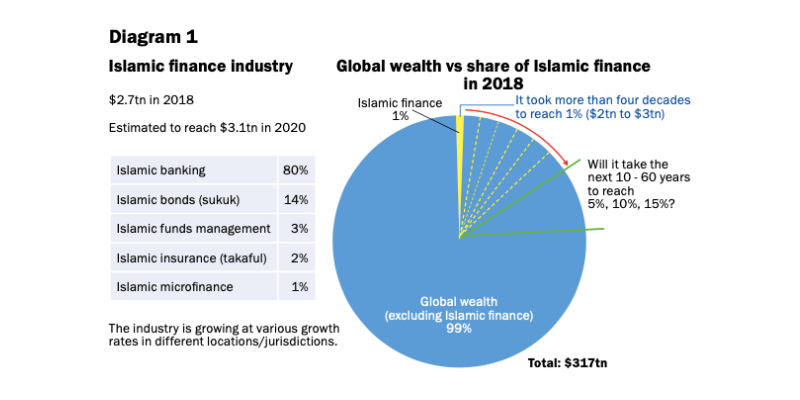The Islamic insurance or takaful sector accounts for just 2% of the Islamic finance industry, which makes up only 1% of the global wealth valued at $317tn in 2018 (Diagram 1).

For the takaful market to grow, the Islamic finance industry must grow beyond the statistics we have been witnessing over the last four decades. We have had ample time to build the foundation and experiment with the modern way of offering Shariah-compliant products and services. It is now time to bring in a major slice of the global wealth to the Islamic finance fold – takaful included.
For the Islamic finance industry to complement or grow the takaful sector, it must look at expanding the size of the pie – meaning we must have the tools and techniques to market shariah-compliant products and services to people of all faiths – beyond the Muslim clientele. This must be done not by selling the sentiments of the religious principles, but by being competitive in the market while addressing the values and benefits that takaful brings, ie, to protect the fabric of our society, and by being ethically, socially and morally responsible through every transaction/activity.
Furthermore, Environmental, Social and Governance (ESG) factors, which are often discussed in global forums today, are also in line with shariah principles – making takaful even more appealing.
Another important factor to drive the growth of takaful is to look beyond the offerings of conventional insurance. Although competition is stiff and tough, the Islamic finance and takaful industry must look beyond replicating or competing with conventional offerings because the impact of this approach will be very minimal at the global level to show the growth potential of the industry. Taking this approach, Islamic finance and the takaful industry will be ‘also-rans’ with their conventional counterparts, and will not have significant impact on the individuals, corporates and the governments at large.
Protect entrepreneurship initiatives

There is a need for ‘entrepreneurial takaful’ to cover entrepreneurs, SMEs and the self-employed and encourage Islamic banks and other Islamic financial institutions – such as takaful, leasing, finance, venture capitalist, etc – to do more of mudarabah (equity participation) and musharaka (partnerships), while reasonably mitigating the risks of these ventures.
Entrepreneurial takaful will add a new dimension to the takaful sector, which currently comprises family takaful and general takaful. Entrepreneurial takaful will bring budding startups and existing ones a bevy of legitimate, promising and workable initiatives, where a group of entrepreneurs, SMEs and the self-employed pool their contributions to cover their pain points with utmost transparency, disclosure and good faith (trust).
Target beyond the Muslim population
By law, Islamic banks are allowed to get involved in trading and investment activities, unlike conventional banks. In the eyes of the regulators, Islamic banks are just like the conventional banks – both are ‘risk averse’. Central bankers have a duty to protect depositors and investors. But due to specific segments of the society who are demanding shariah-compliant offerings due to their faith, Islamic banks have been given the flexibility to make their products shariah compliant. This has resulted in the Islamic finance industry to focus only on the Muslim community when it comes to offering shariah– compliant products.
The challenge is to go beyond this focus on Muslims only to ‘people of all faiths’ to improve their lives, financial and investment choices through equity participation, risk-sharing and fair dealing.
The Islamic bank regulatory framework is not conducive to offer pure Islamic finance products like mudarabah and musharaka to entrepreneurs, SMEs and the self-employed (both Muslims and those of other faiths) due to the ‘risk-averse’ nature of the banking sector.
Encourage the entrepreneurial spirit
We must have innovative shariah-compliant corporate structures and new takaful products to take advantage of the growth potential and support the growing entrepreneurial initiatives globally. This is especially crucial as millennials and the future generations are building their business acumen and looking for support as they venture into the entrepreneurial world. An entrepreneurial takaful plan could be the answer.
The Islamic finance and takaful industry can turn these entrepreneurs into ‘ethical, moral and social’ entrepreneurs by supporting their initiatives that are in line with global frameworks such as ESG and Sustainable Development Goals (SDG).
Apart from the general takaful or conventional insurance coverage or protection for business situations like fire, burglary, unproductive plant & machinery, or any other events that may occur during the normal course of business, this group is looking for a model that will address all their business concerns.
We often hear from budding entrepreneurs that they have a great idea and are confident that it will work, but they often fail due to the lack of capital or funds to start or grow the business. Some resort to private lenders, ie, loan sharks, eventually losing their profits and capital.
Islamic banks are looking for risk mitigation. Can takaful operators offer risk mitigation by pooling all the entrepreneurs (contributing to the entrepreneurial takaful plan) to cover any losses, capital/profits repayment (up to a certain extent – not 100% but at least 20% coverage) and build on the processes and systems?
For example, if 100 entrepreneurs, SMEs and the self-employed are contributing to the ETP and 20% of them go bust (even after thorough review, vetting and stringent processes) – can this 20% be covered/ protected for those funding (either Islamic banks or any other shariah-compliant corporate structure) through musharaka and mudarabah?
Many Islamic banks shy away from taking on ‘risky business’ without even trying to build a system to tap into reasonably secured musharaka and mudarabah opportunities, while ensuring established risk mitigants are available through takaful coverage.
Is the market ready to innovate and look for solutions that can in turn boost the Islamic finance and takaful industry to make a significant impact in the local, regional and global markets?
This is the question for stakeholders in the sector to ponder.
